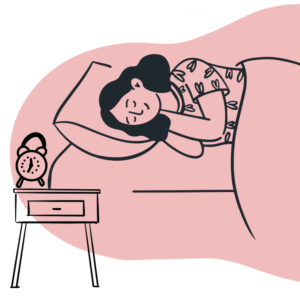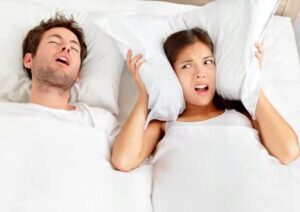Bruxism: How to Deal with Teeth Grinding
Disclosure: By clicking on the product links in this article, Mattress Nerd may receive a commission fee at no cost to you, the reader. Read full disclosure statement.
Grinding your teeth at night can make it tough for you to get enough sleep and can even disrupt your partner. But besides being a nuisance to your sleep hygiene, teeth grinding (also called bruxism) can cause painful jaw and tooth damage. Here’s what causes bruxism and what treatments are available to help you avoid teeth grinding while you sleep.
Bottom Line: What is Bruxism and How is it Treated?
Bruxism causes people to grind or clench their teeth together. Teeth grinding often happens at night while you sleep and can be mild or severe enough to damage your jaw and teeth. Bruxism treatments often include mouth guards, botox injections, therapy, and dental procedures to reduce stress and teeth damage.
What is Bruxism/Teeth Grinding?
Teeth grinding happens when jaw muscles (aka the masticatory muscles) activate and cause the lower jaw bone to thrust or clench. Bruxism is a condition that causes teeth grinding during the day or at night. Sleep bruxism is considered a sleep disorder where people grind their teeth while snoozing.
Folks with sleep disorders like snoring and sleep apnea are more likely to deal with teeth grinding. Sometimes sleep bruxism is mild and goes away without treatment. But long-term teeth grinding can lead to severe tooth damage, jaw disorders, and pain.
Causes
Researchers aren’t entirely sure what causes bruxism, but it’s likely related to micro-arousals and activating your central nervous system while you sleep. Stress and anxiety may also trigger teeth grinding, and uneven teeth or a misaligned jaw may contribute to clenching that leads to teeth grinding.
Teeth grinding usually occurs during Stages 1 and 2 (N1 and N2) of your sleep cycle—where you spend the majority of your time sleeping. N2 is a non-rapid eye movement (NREM) sleep stage where the muscles begin to relax, but you also get quick bursts of brain activity. Researchers have also found less than 10 percent of people experience teeth grinding during REM sleep. While in REM sleep, you’re more likely to experience sleep arousals caused by high brain activity and sudden muscle movements during vivid dreams.
Bruxism is also more common in children and adolescents, as well as folks with risk factors like:
- Emotional stress
- Anxiety disorders
- Smoking, drinking alcohol, and recreational drug use
- Drinking caffeine
- Family history of bruxism
- Sleep disorders like sleep apnea
- Neurodevelopmental conditions like Rett syndrome, Down syndrome, and attention-deficit/hyperactivity disorder (ADHD)
Symptoms
Teeth grinding not only puts pressure on your teeth but also affects your jaw structure and muscles. Some of the main symptoms of bruxism include:
- Temporomandibular joint (TMJ) problems like jaw pain, earache, and headache
- Sore jaw, neck, and facial muscles—usually in the morning
- Tooth pain
- Chipped, loose, and cracked teeth
- Worn-down tooth enamel
- Sores on the inside of the cheek from chewing
- Tooth sensitivity to hot, cold, or sweet foods or drinks
- Insomnia and sleep disruption
Teeth grinding at night can often be loud enough to wake your sleep partner. Some people with bruxism may also never notice symptoms.
Treatments
Teeth grinding treatment often depends on the underlying cause and the severity of jaw and tooth damage. There is no easy way to cure bruxism. Treatments typically involve reducing pain, preventing clenching, and preventing further tooth damage.
At-Home Remedies
If you grind your teeth, you should see a dentist to evaluate the extent of the damage and other ways to prevent grinding. However, you can still help relieve and prevent pain related to teeth grinding at home with the following tips:
- Apply ice or a warm, wet compress to sore jaw muscles
- Stop eating dense, hard-to-chew foods like nuts, steak, and candy
- Avoid chewing gum
- Complete mouth stretching exercises that help improve your jaw’s range of motion (see your dentist for exact practices)
- Massage any painful nodules in your neck, shoulders, and face
- Work on relaxing the face and jaw muscles during the day
- Practice relaxation techniques like deep breathing and meditation to help reduce stress
- Avoid drinking caffeine
- Avoid drinking alcohol and smoking
Medical Treatments
Seeing your dentist is the best way to treat teeth-grinding issues before it damages your teeth or jaw. Your dentist or healthcare provider can help treat bruxism in a few ways:
- Mouth guards or splints. These custom appliances fit over your upper or lower teeth to help protect your chompers from grinding. Mouth guards also help keep your jaw in a more relaxed position to help prevent grinding and TMJ pain.
- Tooth repair. If your teeth are damaged or cause you to clench, your dentist can repair teeth. This often involves crowns, bonds, veneers, and root canals to fix the damage and relieve pain.
- Muscle relaxants. These medications are taken before bed to help relax the jaw muscles and prevent nighttime jaw clenching that leads to grinding.
- Botox injections. Injecting botulinum toxin into the jaw muscles may help relax the muscles in people with severe teeth grinding when other treatments don’t help.
Behavior and Stress management
Since stress and anxiety can trigger teeth grinding, treating an underlying anxiety disorder and learning to manage stress may help treat bruxism. Some ways you can manage your stress or adjust teeth-grinding behaviors include:
- Cognitive behavioral therapy (CBT)
- Self-hypnosis
- Biofeedback devices
- Physical therapy
Medication usually isn’t an effective way to treat bruxism. However, if sudden stress or anxiety triggers teeth grinding, your healthcare provider may prescribe medications that help you manage anxiety.
When to Call a Doctor/Dentist
See your dentist if you have teeth-grinding symptoms that don’t disappear after a few weeks of at-home remedies. It’s especially important to see a dentist if you have issues eating, pain, or trouble opening your mouth. Early teeth grinding intervention can help you find treatments that prevent tooth and jaw damage.
Frequently Asked Questions
How do I stop grinding my teeth?
There is no simple way to stop teeth grinding. You usually need to see a dentist or healthcare provider for treatment. If stress and anxiety cause you to grind your teeth, learning to manage stress and anxiety triggers may help. Jaw exercises may also help you stop clenching your teeth together, which leads to grinding.
Is teeth grinding a serious problem?
Teeth grinding doesn’t usually cause serious issues. Still, long-term teeth grinding can cause pain, tooth damage, and jaw disorders like TMJ. Severe teeth grinding can break down tooth enamel—leaving you susceptible to cavities and tooth sensitivity— and crack, chip, or loosen your teeth.
Is teeth grinding related to anxiety?
Anxiety may trigger teeth grinding in some people. Research has found folks with high stress and anxiety levels often grind their teeth at night. However, not everyone who grinds their teeth has anxiety.
Takeaway
Bruxism is a sleep disorder where people grind their teeth together at night. Researchers believe teeth grinding is caused by brain activations and arousal while sleeping. Stress and anxiety may also trigger bruxism. Symptoms of teeth grinding can include headaches, jaw pain, and cracked or worn teeth. In severe cases, you may damage your jaw. Bruxism treatments often aim to reduce stress and tooth damage, but there is no easy cure for teeth grinding. Regular dental checkups are the best way to help prevent damage from teeth grinding.
Source List
- Bruxism. (2022). https://medlineplus.gov/ency/article/001413.htm
- Bruxism. (2022). https://www.nidcr.nih.gov/health-info/bruxism
- Gerstner GE, et al. (2022). Sleep-related bruxism (tooth grinding). https://www.uptodate.com/contents/sleep-related-bruxism-tooth-grinding
- Kuhn M, et al. (2018). Risk factors for bruxism. https://pubmed.ncbi.nlm.nih.gov/29533049/
- Mesko ME, et al. (2017). Therapies for bruxism: A systematic review and network meta-analysis (protocol). https://www.ncbi.nlm.nih.gov/pmc/articles/PMC5237268/
- Patel AK, et al. (2022). Physiology, sleep stages. https://www.ncbi.nlm.nih.gov/books/NBK526132/
- Sutin AR, et al. (2010). Teeth grinding: Is emotional stability related to bruxism? https://www.ncbi.nlm.nih.gov/pmc/articles/PMC2934876/
- Yap AU, et al. (2016). Sleep bruxism: Current knowledge and contemporary management. https://pubmed.ncbi.nlm.nih.gov/27656052/


